ICN Represents Nursing on the Global Stage at the UN General Assembly and Summit of the Future
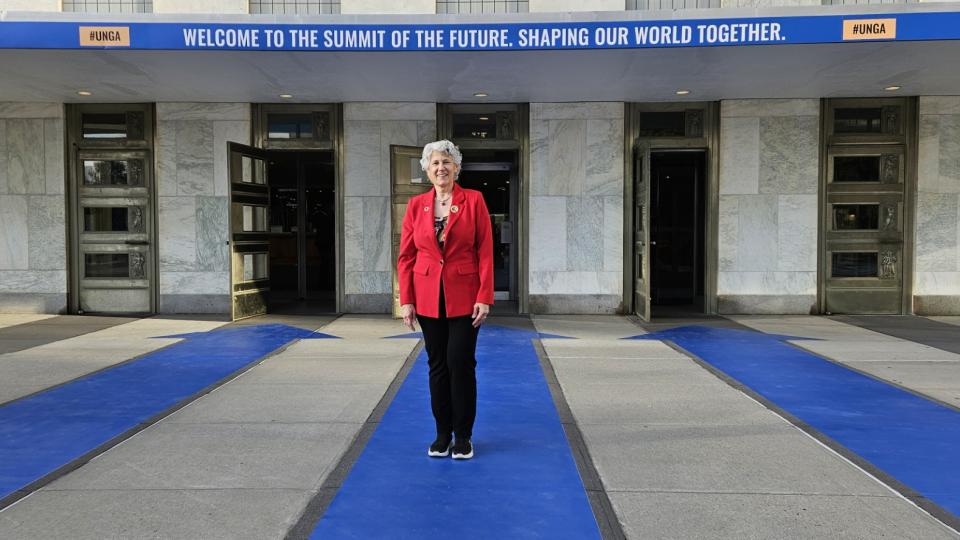
The International Council of Nurses (ICN) brought a strong nursing presence to the 79th session of UN General Assembly (UNGA) in New York, 21–27 September 2024.
ICN’s President Dr Pamela Cipriano led the ICN delegation, which included Dr Gill Adynski, ICN Nursing & Health Policy Analyst, and Dr Holly Shaw, ICN Representative at the UN Economic and Social Council.
A ‘once-in-a-generation’ Summit of the Future and Pact for the Future
Dr Cipriano represented ICN at the Summit of the Future, 22–23 September. UN Secretary-General António Guterres set the context for the ‘once-in-a-generation’ event by acknowledging the urgent need to revitalize multilateral collaboration and instruments to meet the enormous challenges the world is currently facing, referencing geopolitical conflicts, global inequalities and debt burdens, climate change, and the digital divide.
ICN’s President attended high-level Summit sessions on topics including transforming global governance, digital inclusivity, and turbocharging the Sustainable Development Goals (SDGs). Several speakers made strong calls for sustainable financing and debt relief as well as more inclusive multilateral decision-making to shape a more equitable and resilient future for all.
The Pact for the Future, the Summit’s main outcome document, was adopted by the UNGA on 22 September alongside the Global Digital Compact and the Declaration on Future Generations.
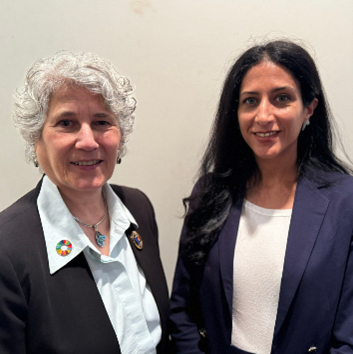 That same day, the World Health Professions Alliance (WHPA) called on world leaders to urgently increase investment in the health workforce in order to fulfil the commitments outlined in the Pact. Dr Cipriano and Dr Lujain Alqodmani, President of the World Medical Association, jointly represented the WHPA at the Summit. The WHPA’s statement noted that the Pact ‘recognizes the fundamental role of health in addressing poverty, inequality and environmental changes although it regrets that health is not more prominent, given its central role’.
That same day, the World Health Professions Alliance (WHPA) called on world leaders to urgently increase investment in the health workforce in order to fulfil the commitments outlined in the Pact. Dr Cipriano and Dr Lujain Alqodmani, President of the World Medical Association, jointly represented the WHPA at the Summit. The WHPA’s statement noted that the Pact ‘recognizes the fundamental role of health in addressing poverty, inequality and environmental changes although it regrets that health is not more prominent, given its central role’.
Dr Cipriano commented: “The Pact for the Future is an important step towards to the resolute and collective approach needed to address the enormous global challenges before us. However, to make the Pact’s commitments a reality, we now need world leaders to take decisive and unified action to address severe health worker shortages and fund a sustainable and equitable healthcare workforce as the path to accessible health care for all.”
UHC, One Health, and addressing AMR
ICN’s President participated in the high-level meeting on antimicrobial resistance (AMR) held on 26 September, where the UNGA approved a political declaration with a set of targets and actions to reduce the unnecessary deaths associated with AMR annually by 10% by 2030. Previously, at the preparatory multi-stakeholder hearing held earlier this year, Dr Cipriano remarked that “AMR cannot be addressed in isolation from universal health coverage” and urged UN leaders to invest in primary health care as part of a One Health response that unites the human, animal, agricultural and plant sectors. Speakers at the UNGA meeting stressed the enormous global impact of AMR, which causes 1.3 million deaths annually, with WHO Director General Dr Tedros Adhanom Ghebreyesus emphasizing that the heaviest burden is borne by low- and middle-income countries (LMICs). Other speakers highlighted the role of climate change in increasing AMR and noted the disproportionate impact on women, who comprise 70% of the health workforce, including the majority of nurses. ICN witnessed and supported strong calls to reinforce health systems, fund national action plans, improve data collection, and advance cross-sector collaboration across human and animal health, waste management, and water and sanitation to effectively address this complex challenge.
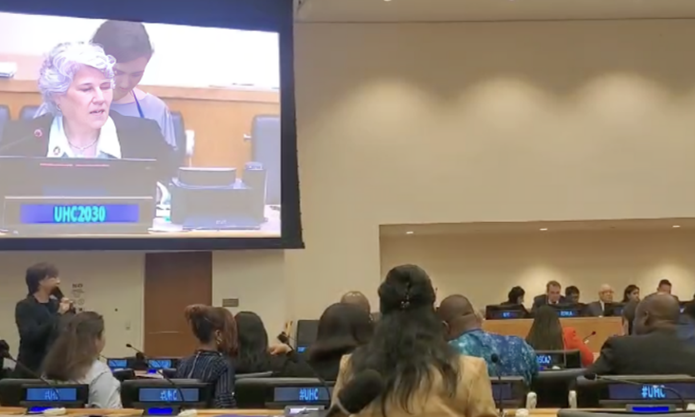 The ICN delegation also participated in the World Medical Association (WMA) and International Center for Antimicrobial Resistance Solutions (ICARS) event “From Policy to Action: Successful Implementation of Multisectoral AMR Programs in LMICs”, where WMA’s President highlighted the critical role of health professionals as clinicians, educators, and policy advocates. ICN’s President, who is co-chair of UHC2030, facilitated the Friends of UHC Ministerial Annual Meeting which focused on targeted policies and restructuring of global international financing. In Dr Cipriano’s remarks, she noted that the event was an important opportunity to “celebrate our collective commitment to advance universal health coverage and explore how we can ensure equitable access to health services through financial protection”. The group was encouraged to engage in the UHC Day campaign to accelerate progress towards UHC by 2030.
The ICN delegation also participated in the World Medical Association (WMA) and International Center for Antimicrobial Resistance Solutions (ICARS) event “From Policy to Action: Successful Implementation of Multisectoral AMR Programs in LMICs”, where WMA’s President highlighted the critical role of health professionals as clinicians, educators, and policy advocates. ICN’s President, who is co-chair of UHC2030, facilitated the Friends of UHC Ministerial Annual Meeting which focused on targeted policies and restructuring of global international financing. In Dr Cipriano’s remarks, she noted that the event was an important opportunity to “celebrate our collective commitment to advance universal health coverage and explore how we can ensure equitable access to health services through financial protection”. The group was encouraged to engage in the UHC Day campaign to accelerate progress towards UHC by 2030.
Dr Cipriano also attended an event on promoting the Lusaka Agenda, which was launched on UHC Day 2023 as a foundation for coordinated action by Global Health Initiatives (GHIs) and the wider health ecosystem to address changing health needs, financing, and governance for achieving UHC.
Conflict response and global peace efforts
ICN’s delegation also engaged in sessions focused on peacebuilding and conflict resolution. ICN believes that peace and health are intimately connected and works on several initiatives to promote humanitarian relief in conflict zones, support nurses through the #NursesforPeace campaign, and advocate for nursing’s contribution to peaceful, healthful societies. Earlier this year, Dr Cipriano wrote to the Secretary General of the United Nations (UN) calling for firm and decisive action to stop the growing number of illegal attacks on nurses and health care facilities we are seeing in war zones around the world. At the UNGA, ICN’s President attended the Summit of the Future high-level dialogue on enhancing multilateralism for international peace and security, where discussions reaffirmed the importance of upholding international law in conflicts and emphasized the need to make global institutions more representative and responsive to the complexity of contemporary geopolitical challenges.
ICN was also present at the High-Level Meeting on the Commemoration of the International Day for the Total Elimination of Nuclear Weapons on 26 September, where Secretary-General Guterres warned that the threat of nuclear arms has never been greater and called for urgent disarmament to safeguard global security and peace.
Climate action and digital health
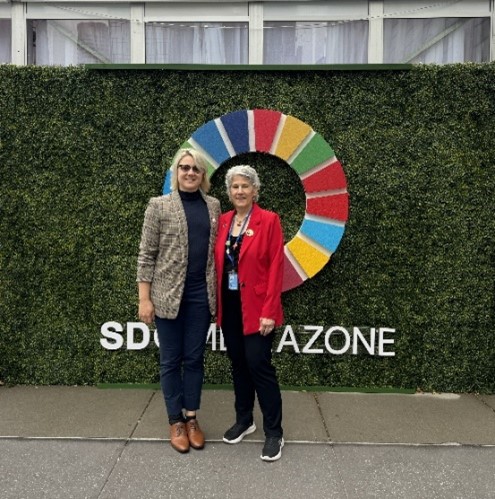 ICN advocated for nursing at several NYC Climate Week events. Dr Cipriano spoke at the first-of-its-kind “Health Systems Implementing Climate Action” event organized by the Yale Center on Climate Change and Health and the New York Academy of Medicine. Her contribution highlighted policy for health system readiness and resilience and the importance of climate action within roadmaps for well-being and meaning in work. Dr Gill Adynski delivered the opening remarks at the Alliance of Nurses for Healthy Environments (ANHE) “Climate Action for Health: Solutions from the Health Sector” event, emphasizing the crucial role of nurses in climate change response and prevention. The ICN delegation also attended health and climate sessions hosted by organizations including the World Health Organization (WHO), Health Care Without Harm, and the World Bank's Climate Investment Funds.
ICN advocated for nursing at several NYC Climate Week events. Dr Cipriano spoke at the first-of-its-kind “Health Systems Implementing Climate Action” event organized by the Yale Center on Climate Change and Health and the New York Academy of Medicine. Her contribution highlighted policy for health system readiness and resilience and the importance of climate action within roadmaps for well-being and meaning in work. Dr Gill Adynski delivered the opening remarks at the Alliance of Nurses for Healthy Environments (ANHE) “Climate Action for Health: Solutions from the Health Sector” event, emphasizing the crucial role of nurses in climate change response and prevention. The ICN delegation also attended health and climate sessions hosted by organizations including the World Health Organization (WHO), Health Care Without Harm, and the World Bank's Climate Investment Funds.
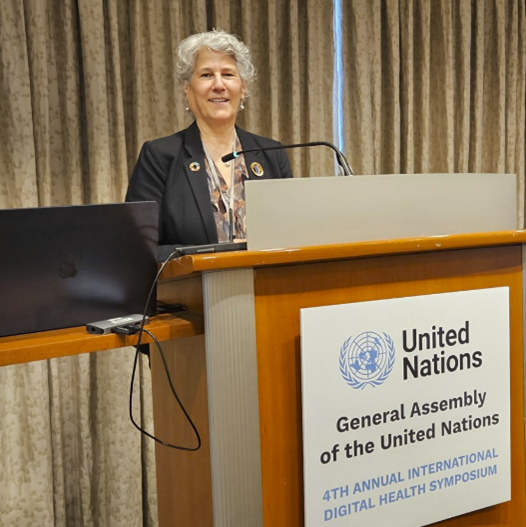 Digital health was another key focus area for ICN’s activities. Dr Cipriano spoke at various events at the 4th Digital Health Symposium, including a leadership panel on the global health landscape where she emphasized the many ways nurses accelerate primary care interventions that promote accessible health services — and called for action to close ‘digital divides’ that exclude many from the benefits of digital health care. She also delivered remarks at a Digital Health Symposium event marking the launch of a new School of Nursing at Maynooth University, Ireland. In addition, ICN’s delegation attended a high-level WHO session exploring digital technologies for noncommunicable disease management as well as a session hosted by Gavi, the Vaccine Alliance, which highlighted the potential of digital tools to improve vaccination efforts in low-coverage regions.
Digital health was another key focus area for ICN’s activities. Dr Cipriano spoke at various events at the 4th Digital Health Symposium, including a leadership panel on the global health landscape where she emphasized the many ways nurses accelerate primary care interventions that promote accessible health services — and called for action to close ‘digital divides’ that exclude many from the benefits of digital health care. She also delivered remarks at a Digital Health Symposium event marking the launch of a new School of Nursing at Maynooth University, Ireland. In addition, ICN’s delegation attended a high-level WHO session exploring digital technologies for noncommunicable disease management as well as a session hosted by Gavi, the Vaccine Alliance, which highlighted the potential of digital tools to improve vaccination efforts in low-coverage regions.
ICN’s delegation also attended several events at the Foreign Policy (FP) Global Health Forum, which brings together high-level leaders, policy makers, industry experts, and civil society with the goal of turning critical health insights into action. At discussions focused on the climate-health nexus, WHO’s Director-General stressed that climate action is also health security and defence action.
ICN was also present at several other important activities including a Pandemic Action Network session focused on addressing pandemics, conflicts, and climate change as interconnected global health crises as well as events on global health equity and the health workforce hosted by the Partnership for Maternal Newborn and Child Health (PMNCH) and Seed Global Health.
Throughout the UN General Assembly, ICN connected with partners and allies including the UN Health Impact Coalition, Conference of Non-Governmental Organizations in Consultative Relationship with the United Nations (CoNGO), country-level UHC advocacy groups, and nurse leader colleagues.
ICN’s President reflected: "The UN General Assembly, and the historic Summit for the Future, was a vital opportunity for ICN to advocate for nursing and health at the highest levels as we participated in important discussions on topics ranging from antimicrobial resistance and universal health coverage to climate action, digital health transformation, and addressing conflicts. Nurses, as the largest health workforce on the frontlines of primary care, are central to all of these issues. It is now time for the UN leaders to translate the Pact for the Future and the commitments made during UNGA into concrete actions by financing reforms to meet the SDGs and investing in health systems and health workers. ICN and the global nursing community stand ready to continue to advance our shared goals of health, equity, and peace for all.”